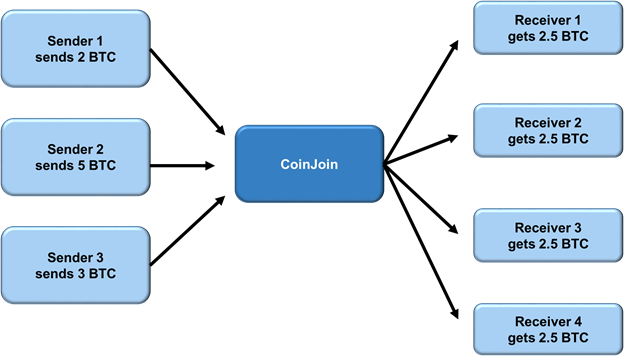Many Bitcoin users place high importance on the privacy of their transactions. Indeed, one of the fundamental principles of Bitcoin outlined by the blockchain’s creator, Satoshi Nakamoto, in Bitcoin’s whitepaper was the ability to transact in full privacy. That is why Bitcoin addresses are never directly linked to a person’s ID.
However, it soon became obvious that a person’s identity might be easily deduced from their transactions if they use off-chain services with Know Your Customer (KYC) requirements. This led to the rise of a variety of privacy-enhancing blockchain solutions. One of the most popular of these is CoinJoin.
What Is CoinJoin?
CoinJoin refers to a specific way of transacting on the blockchain, involving multiple senders and multiple receivers of crypto funds. Under CoinJoin, funds from two or more senders are combined, reshuffled, and then sent to multiple receiver addresses, making it difficult to deduce which particular sender made a transfer to a specific receiver address.
The image below demonstrates a simple CoinJoin operation involving three sender and four receiver addresses.

The key idea behind CoinJoin is to prevent a third party from finding out the exact source, destination, and amounts involved in a specific transfer between two people. In the image above, each receiver address got an equal amount of 2.5 BTC. This is not an absolute requirement in CoinJoin, and the receivers may get differing amounts.
However, allocating equal amounts to receivers is recommended as a CoinJoin best practice since it makes it harder to deduce the precise sender for a specific receiver address.
The entire CoinJoin operation shown above involves Bitcoin addresses, not necessarily different individuals. Since each person may have multiple addresses on the BTC blockchain, the exact number of different individuals who have carried out the CoinJoin operation is unknown.
In fact, the entire CoinJon transfer might, in theory, involve only one person distributing the amounts between their addresses, or just two people who would like to obfuscate precise transfers between them.
CoinJoin vs Mixing Services
CoinJoin is not the only blockchain solution focused on helping users carry out private transactions. An alternative to CoinJoin is third-party mixing services based on a similar concept but somewhat different procedure. These mixing services act as custodians of funds in crypto fund transfers.
They accept funds from the sender, mix them in their pool of funds from many different transfers, and then send the amount to the receiver from their own address. Mixing services simply act as an intermediary in the transfer. The exact amount sent and received is usually the same. However, linking the sender to the ultimate receiver becomes impossible due to the involvement of a mixing service.
Unlike the mixing services, CoinJoin is a non-custodial operation. There is no third-party service provider who accepts funds from you and delivers them to the receiver. In order to carry out a CoinJoin operation, multiple individuals need to communicate, agree on transfer amounts, and coordinate their efforts.
The actual execution of a CoinJoin transfer is supported by some cryptocurrency wallets, such as Wasabi Wallet and Samourai Wallet.
Compared to mixing services, also known as mixers or tumblers, CoinJoin has the advantage of being non-custodial and independent from a third-party intermediary. Many crypto privacy pundits point out that these mixing intermediaries may not be completely trusted to keep your transfer data private. With CoinJoin, there are no such concerns.
The downside of CoinJoin is the need to coordinate efforts with other crypto users to organise a CoinJoin transfer. Such communication, if carried out via unsecured online channels, might be intercepted by third parties willing to learn a little too much about your crypto operations.
CoinJoin might be considered a controversial method of crypto transacting given its focus on anonymisation. However, for privacy connoisseurs, it is among the most valuable techniques. In the age of pervasive online surveillance and bulk trade in users’ personal data, services like CoinJoin help crypto users transact with peace of mind. At the end of the day, the entire concept of cryptocurrency was created with privacy and anonymity in mind. While some might regard CoinJoin as a borderline shady practice, many others would be happy to have their financial privacy preserved, thank you very much!

